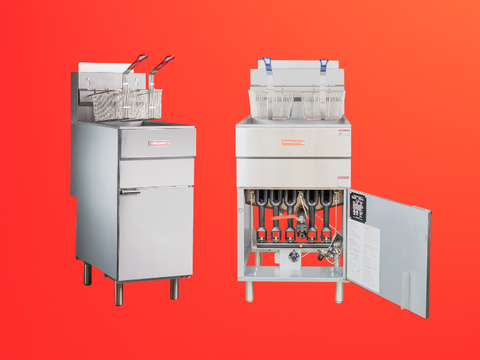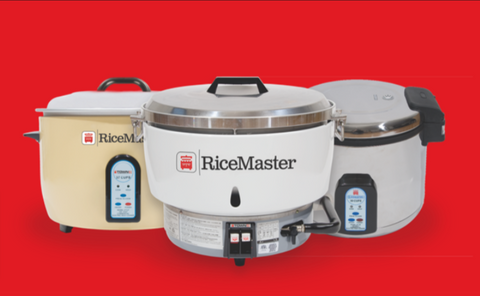I. Understanding Commercial Fryers
Commercial fryers are industrial-grade cooking appliances used in professional kitchens, including restaurants, fast food chains, catering services, and more. They are designed to handle large quantities of food, ensuring consistent and efficient frying.
Types of Commercial Fryers:
a) Open Pot Fryers: These traditional fryers consist of an open pot with a heating element at the bottom, ideal for frying a variety of food items.
b) Tube Fryers: Featuring long tubes filled with hot oil, these fryers offer quick heat recovery and are suitable for high-demand environments.
c) Flat-Bottom Fryers: Designed for specialty frying, such as doughnuts or tortilla chips, these fryers provide a wide cooking surface.
Key Features:
a) Oil Capacity and Recovery Time: The fryer's oil capacity and recovery time play a crucial role in maintaining cooking consistency and throughput.
b) Temperature Control: Precise temperature control ensures consistent cooking results and prevents food from becoming too oily or undercooked.
c) Filtration Systems: Advanced fryers incorporate built-in filtration systems that help extend oil life and maintain food quality.
II. Benefits of Commercial Fryers
Commercial fryers offer numerous advantages for businesses operating in the food industry. Here are some key benefits:
Efficiency and Speed: Commercial fryers are designed to handle large volumes of food, ensuring faster cooking times and improved productivity, thereby meeting customer demands during peak hours.
Consistency and Quality: With precise temperature control and advanced cooking features, commercial fryers provide consistent results, producing evenly cooked, crispy, and delicious fried foods.
Versatility: These fryers offer flexibility in cooking various food items, ranging from fries and chicken to onion rings and seafood, making them suitable for diverse menus.
Durability and Longevity: Built with robust materials and designed for heavy-duty use, commercial fryers are engineered to withstand the demands of high-volume cooking, ensuring longevity and durability.
Safety Features: Most commercial fryers come equipped with safety features such as temperature sensors, automatic shut-off mechanisms, and splash guards, ensuring a safer cooking environment for kitchen staff.
III. Choosing the Right Commercial Fryer
Selecting the ideal commercial fryer for your establishment requires careful consideration of several factors. Here are some key points to keep in mind:
Cooking Volume and Capacity: Assess the volume of fried food your establishment requires daily. Choose a fryer with an appropriate oil capacity and basket size to meet your output needs efficiently.
Energy Efficiency: Look for fryers with energy-saving features, such as high-efficiency burners or insulated tanks, to reduce operational costs and minimize environmental impact.
Maintenance and Cleaning: Consider fryers with easy-to-clean features like removable heating elements, oil filtration systems, and dishwasher-safe components to simplify maintenance routines.
Safety Considerations: Prioritize fryers with safety features like temperature controls, overheat protection, and automatic shut-off systems to mitigate the risk of accidents in the kitchen.
Space and Layout: Evaluate the available space in your kitchen and choose a fryer that fits well within your layout, ensuring smooth workflow and easy accessibility.
Budget and Cost: Set a budget range and compare fryers based on their features, durability, and warranty to find the best value for your investment.
The Distinction: Electric Fryers vs. Natural Gas Commercial Fryers
Commercial fryers are essential appliances in the food industry, offering efficient and consistent frying capabilities. When it comes to choosing the right fryer for your establishment, one of the primary considerations is the fuel type. The two main options available are electric and natural gas commercial fryers. Understanding the differences between these types will help you make an informed decision that suits your specific needs. Let's explore the contrasting features and benefits of electric and natural gas fryers.
Energy Source:
Electric Fryers: Electric fryers rely on electricity as their energy source. They require a direct electrical connection and utilize heating elements immersed in oil to generate heat.
Natural Gas Fryers: Natural gas fryers, on the other hand, utilize natural gas as their fuel source. They require a gas line connection and utilize burners to heat the oil.
Heating Efficiency:
Electric Fryers: Electric fryers provide consistent and precise heat distribution. They often have multiple heating elements, which allow for better heat control and uniform cooking results. However, electric fryers may take slightly longer to heat up and recover temperature after loading food.
Natural Gas Fryers: Natural gas fryers offer quick heat-up times and rapid temperature recovery due to the high heat output of gas burners. They provide instantaneous heat adjustments, allowing for immediate response to cooking requirements.
Temperature Control:
Electric Fryers: Electric fryers typically have accurate and easily adjustable temperature controls. They often come with digital displays and thermostats, providing precise temperature settings for optimal cooking results. This feature is particularly beneficial when frying delicate items that require precise temperature management.
Natural Gas Fryers: Natural gas fryers usually have manual controls for adjusting the flame intensity. While they offer flexibility in heat adjustments, the temperature control may not be as precise as electric fryers. Additional equipment, such as temperature probes, can be used to monitor and maintain consistent frying temperatures.
Installation and Cost Considerations:
Electric Fryers: Electric fryers are generally easier to install since they only require a standard electrical connection. However, they may have higher operating costs due to electricity rates, especially if used continuously during peak hours.
Natural Gas Fryers: Natural gas fryers require a gas line connection during installation, which may involve additional plumbing work. While they have lower operating costs compared to electric fryers, the initial installation cost can be higher due to the need for professional gas line installation.
Safety Considerations:
Electric Fryers: Electric fryers are considered safer in terms of fire hazards since they do not involve an open flame. They often have safety features such as automatic shut-off systems and overheating protection.
Natural Gas Fryers: Natural gas fryers require caution due to the open flame used for heating. Proper ventilation is crucial to prevent gas buildup, and gas leak detection systems should be in place for safety. However, modern natural gas fryers are equipped with safety features like flame failure devices and high-temperature limits.
Choosing Between Electric and Natural Gas Fryers:
The decision between electric and natural gas fryers ultimately depends on your specific requirements, kitchen setup, and budget considerations. Electric fryers offer precise temperature control and ease of installation, while natural gas fryers provide rapid heat adjustments and potentially lower operating costs. Assess your frying needs, consider energy availability, installation logistics, and ongoing costs to make an informed choice.
Understanding the differences between electric and natural gas commercial fryers empowers you to select the optimal fryer that aligns with your business goals and culinary aspirations.
Commercial fryers are indispensable assets for establishments in the food industry, enabling them to meet the demands of hungry customers with delicious fried delights. By understanding the different types of fryers, their features, and benefits, you can make an informed decision when selecting the perfect fryer for your business. Whether you're running a restaurant, a food truck, or a catering service, a well-chosen commercial fryer will contribute to improved efficiency, consistent quality, and customer satisfaction. So, embrace the world of commercial fryers, and let your culinary creations sizzle and delight!




